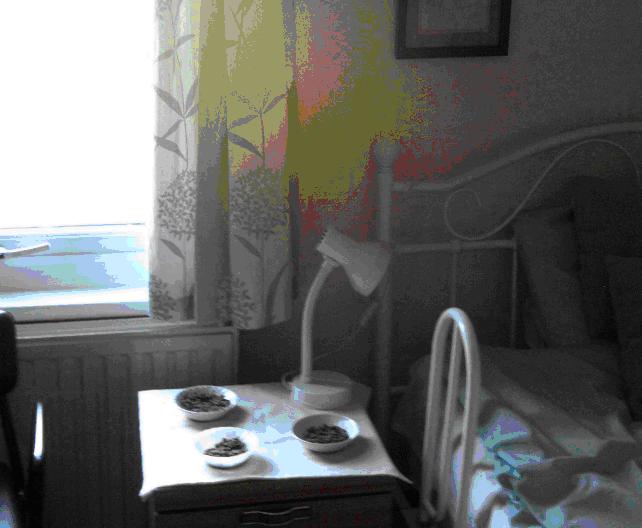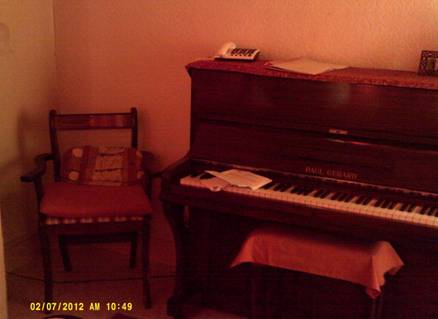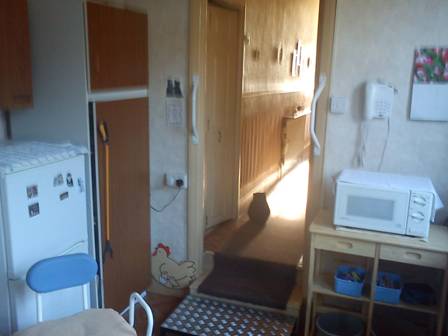Case 05: Vera
Social, cultural and historical context
Vera is an 85-year-old unmarried woman, originally from Scotland, who lives alone with her two cats in her own ground floor flat. She worked as a shorthand typist, retiring at 60. Until recently, she was fully independent but following a recent fall, carers are now visiting her three times daily for a 6-week period. Prior to the fall, she would spend the morning pottering round the flat, seeing to the cats and doing light housework; in the afternoon she would go out shopping or walking and in the evening watch TV or talk to friends on the phone. Now, her days are dominated by the carers’ visits (“though they don’t do much”).
Participant's experience of ageing and ill health
Vera’s medical conditions include a tremor, originally diagnosed as Parkinson’s Disease but later amended to ‘benign essential tremor’, mild hearing impairment, high blood pressure and two recent falls, the latter of which resulted in a brief hospital stay and a broken ankle. She had a stroke affecting the cerebellum (and hence her coordination and balance) about 5 years ago. She also has “stress” (see below), for which she receives some community based counselling and finds this very helpful.
At the time of the initial visit for this study, she is walking with great difficulty using an elbow crutch; the lower half of one leg is in plaster. She is extremely positive about all the treatment and care she has received – from both NHS and social services (but note that Vera’s first contact with one of the research team was in his clinical role in the NHS). When seen early in the research, she expected to return to her previous level of functioning and indeed was fully rehabilitated by the later months of the study.
People in this participant's life
Vera has no contact with her family (“families, you think they should all get on, but they don’t”). Her mother, older sister and twin brother are all dead now. Her brother’s two sons and a daughter (in their 60s now) live in London but she has not seen them for over 20 years. Her contacts are mainly friends who live in the same street. Sadly, her two closest friends, who used to be neighbours, moved away recently (“This is what happens in life. People either conk out or they move away”).
One family down the road has “adopted” Vera: they have a house key, and they came and fed the cats during her recent hospital admission. She also has a weekly home help, Laura. She gives Laura her Attendance Allowance in return for gardening and other odd jobs. Vera values Laura greatly (“she is like a right hand to me”), though she also finds her bossy sometimes. She receives occasional visits from neighbours but says she is not good at visiting others – there is too much to do and she is too tired.
Vera does not attend any social clubs or groups, despite encouragement from some friends to do so. This is a conscious choice:
"I’d rather be with strangers than people I slightly know, and you’ve got to put on a show of some kind. This takes it out of me, being jolly when I’m not. I am quite happy with my own company. I’ve never been one with lots and lots of friends. […] Not that I’m not friendly. I’ve been quite happy with what I’ve got."
What matters to this participant?
Vera’s simple, largely unstructured regular routine matters to her. She gets out and about every day – perhaps to the shops in the town centre by bus or train, or a walk to the local supermarket – usually on her own. The only regular fixed commitment is Laura visiting on Fridays (“I know it seems a very narrow life to you but I’m happy with that life”).
Pride, and especially not being a burden on people, matters to Vera. After the death of her mother, her brother wrote to her to say that visits (to their mother) had become “a duty more than a pleasure”. Vera was upset at this as her mother had doted on him. She began to worry that she might also become a duty and responsibility to her relatives, so she cut herself off and did not provide any contact details when she moved to her new address.
“I think that, being on your own, they [brother and family] are afraid of responsibility…So I gave them their freedom. You may think of that very very strange thing to do. But to me, it meant I wasn’t at the begging bowl”
Vera’s outward appearance also matters. Her tremor bothers her. When a close friend visited last year for Vera’s birthday, they booked to have tea at an upmarket London hotel. But one week before the visit, Vera cancelled because she did not want to be embarrassed in public, though she was ambivalent about this (“Really and truly it’s me, it’s my own pride, it’s so stupid really”).
Vera’s cats matter. Whilst in many ways she feels ready to sell up and move to sheltered housing (it would be more practical and come with some support), she feels that her cats like the current property and a sheltered flat may not come with a cat flap.

Vera's bedroom, showing grab handle and bedside table with 3 bowls of cat food
Vera is under a great deal of stress because of problems with her flat, which she bought 22 years ago. Much work was needed to make the flat habitable, and then a developer refurbished the flat above, leading to repeated leaks and damaged ceilings. Vera is currently pursuing this legally and has written to her local MP. She initially felt she could not sell her flat until she had sorted these problems, but is now considering selling it ‘as seen’.
“The whole of my life has been stress. Even now, even now. I’ve never got away, from living a normal peaceful life, no matter how hard I’ve tried.”
Another contributor to Vera’s perception of chronic stress was caring for a close friend and neighbour, Cathy, who died a year ago from Alzheimer’s disease. What was most stressful though was not providing the care, but the attitudes of others. Vera was criticised for not providing good enough care for Cathy, by other neighbours “who had not even given her a cup of tea”. She also finds her current situation, with carers coming several times a day, stressful both before they arrive and when they are there because she feels “on duty”.
Vera says she has experienced discrimination due to her age and disabilities. For example, she was turned down “automatically” for a credit card, purely on the grounds of her age. She feels that the stress in her life caused her health problems, especially the stroke:
“I think my mind affects my body. I brood on what’s happened to my flat here. And I think this affects your body. […] I think you’ve got to be very careful who you let into your life.”
One of Vera’s great loves is music. She has a piano in the living room. She tells the researcher that she no longer plays because of her tremor, but then gets up and plays a few bars of a Brahms waltz. She stands up to play and the researcher is worried she is going to fall over. She apologises that the piano is out of tune. She says she wants to start playing again, though is worried about disturbing the neighbours upstairs.

The piano in Vera’s living room, which she can no longer play
She digs out a favourite piece of sheet music – a Mozart piano sonata – and says she will keep it out and practise it for when the researchers come again. On the subsequent visit the researchers ask if she has played the piano. She says no:
“I just seem to go from one thing to another and do nothing. I seem to be on the go all the time and yet doing nothing. I must doze off you know […] And the television is a great distraction; I don’t know what we did without it.”
The activities Vera enjoys most now are playing with the cat, doing word puzzles, reading (but only magazines and short stories as she no longer has sufficient concentration for novels) and talking to friends on the phone. She enjoys looking out of her window to see people going past. When last seen, she had begun to play the piano a little again and was taking piano lessons from a neighbour.
Technologies in participant's home and life
Vera has a number of telecare technologies: a pendant alarm (necklace), Tunstall Lifeline unit and a ‘keysafe’ by her front door. These are all provided by the local council and monitored by social services. Vera was not aware of any other telecare equipment, but her flat is equipped with a heat detector (above the cooker), flood detectors (in the kitchen and bathroom) and smoke detector (in the hallway).
She cannot recall how she came to have the telecare equipment, but thinks it has been in place for about 10 years. She feels very positively about her assistive devices – they are “marvellous”. She would never be without her pendant alarm.
Vera is proactive in seeking technologies that may help her overcome her physical limitations. She has bought some weighted cutlery, but also sometimes eats with her fingers or brings a bowl of soup directly to her mouth. She watched ‘Dragon’s Den’ (an innovations programme) on TV and saw some devices presented that might help her – such as a hot water bottle holder, to overcome her tremor when pouring boiling water in.
Materiality and capability
Apart from the ankle injury, Vera’s main problem is her tremor and the poor coordination in her hands and arms. This affects any activity requiring fine control and precision such as pouring water into the cat’s bowl, spooning sugar into tea, and writing. She cannot use the bath at all now. Dialling numbers on her landline telephone is difficult (the mobile is impossible), and she often gets a wrong number in error. She also finds she cannot concentrate as much as she used to. She was unable to use the camera or fill out the diary and scrapbook, partly because of the tremor and partly because of poor concentration, tiredness and other “paperwork” to do.
Vera recounted a story about a much-loved possession – a favourite shopping trolley – that she lost on a coach trip. Even though the trolley was replaced free of charge by the manufacturer when they heard about her loss, the new trolley was not special in the same way because she could not operate it so smoothly:
“Because this [the shopping trolley] was my lifeline, it was my Rolls Royce. This got me out and gave me fun, it gave me confidence, this thing, it was great. It was manoeuvrable, it was stable, it was just marvellous. It is important, top of the list, it’s the most important thing to me because that gets me out, it gets me going on trains, buses, and not a nuisance to people. […] Sometimes it’s just the lucky one that you get, and my lucky one was taken.”
Vera has adapted her flat to make it as easy as possible to manage. She has replaced the carpets with vinyl floors to make it easier to clean because of the cats (“It’s all for simplicity really, making life easy, not too much effort”).

Vera’s kitchen and hallway, showing various daily living aids and adaptations (perching stool, easy reach, grab rails, metal half step)
Vera relies on one close friend to advise on, purchase and set up technology for her. But she does not like to bother others and is going to call out Comet to fix the loss of subtitles on her TV. She says she comes from a generation that does not understand modern technological advances such as computers. She has a fear of many technical things, such as her boiler. She comments that attitudes to technologies change with the generations – her mother was scared of the telephone – but that technologies today have developed particularly rapidly. She recounts an amusing tale of her old-fashioned tin opener that her carer could not work out how to use, so Vera had to demonstrate.
Real incidents of using (or choosing not to use) an ALT
Vera knows how to use her alarm and finds its presence very reassuring. In the past, she has pressed the red button by accident and been contacted to see if she was all right.
“It’s like having another person in the place. You get them [the call centre] day or night, and they even give you information. When the electric strike was on, they’d ring up and say it will only last for such and such, and are you all right?”
However, she also says that she would be very reluctant to activate it because of the “fuss” – in particular the possibility of paramedics turning up and perhaps even a hospital admission. Once, the green light was flashing, so she pressed the device to ask what to do. On another occasion, she had accidentally unplugged the unit (when vacuuming), and the reserve battery had run down over several hours. Much later, in the night, a voice appeared announcing “There is no known power”, which she found unnerving (at first she thought it was a ghost).
Despite claiming to wear her pendant alarm “always”, Vera had a fall in between the second and third study visits, and she was not wearing the alarm when she fell. She had become distracted during her normal dressing routine because the doorbell had rung, and the pendant (unusually) remained hanging on the headboard of her bed.
Comment
Vera’s case is an example of the ‘self-exile’ into which older people sometimes place themselves to avoid being a burden to family or friends. She would prefer to have no contact with her family than feel she is causing them work or inconvenience.
Importantly, however, whilst Vera is relatively socially isolated, she is less lonely than many other participants in our sample since – in her words – she likes her own company. This appears to be due to a character trait but also partly because making social contact with others involves work (and as Vera points out, is more work when interacting with friends than with strangers). Vera’s case illustrates how what Goffman called ‘face work’ (keeping up appearances in public) matters hugely to older people, and how visible physical impairments can interfere with social activities. In the presence of multiple energy-draining physical conditions (tremor, recent injuries) ‘face work’ is particularly difficult. In the circumstances, perhaps it is unsurprising that Vera has chosen cats to keep her company.
Vera’s case illustrates the importance of psychosocial stress in the lives of older people. Poverty and unsuitable housing mean that basic needs such as food and shelter may not be adequately met – or at least, there is a risk that they will not be met in the future. Discrimination, prejudice and the (ill-informed) judgements of others in the local community can combine to make life miserable even when physical impairments are minimal – and especially when they are not. Technology may solve some problems but it does not change people’s attitudes.
Vera’s lost ‘lucky’ shopping trolley is an excellent illustration of what Heidegger called ‘technology ready-to-hand’ – a technology that is so useful and easy to use for the individual that it feels like an extension of their own body (or mind) and seamlessly enhances their own sensory and motor abilities. Her inability to achieve the same ‘ready-to-hand’ relationship with a supposedly identical replacement trolley is interesting and hard to explain. It suggests that the interaction between materiality and capability is a subtle and co-evolving one: as the person’s capability deteriorates, the familiar technology comes to be used adaptively to compensate for loss of sensory or motor function, and that this material compensation is an embodied, tacitly-learnt and subtle phenomenon.
Similarly, Vera’s diminishing ability to make music illustrates the link between materiality (the physical reality of the piano, which demands a complex skill set) and capability (the loss of control, coordination and concentration that results from multiple interacting neurological conditions). Music is evocative, enriching and above all culturally embedded. Similarly, loss of concentration means that Vera can no longer read literature; she must fill her time with passive television watching and ‘word puzzles’. Thus, the cultural world shrinks in parallel with the physical and social world.
Whilst Vera is proactive in searching for technologies that will compensate for specific physical impairments such as tremor, the options for compensating for non-specific impairments such as chronic tiredness and poor concentration are limited. Furthermore, progressive loss of concentration means that even when a person is able to use an assistive technology, they may forget to carry or use it. Technologies that bypass the awareness and agency of the individual may solve some but not all assistive living challenges in such cases.